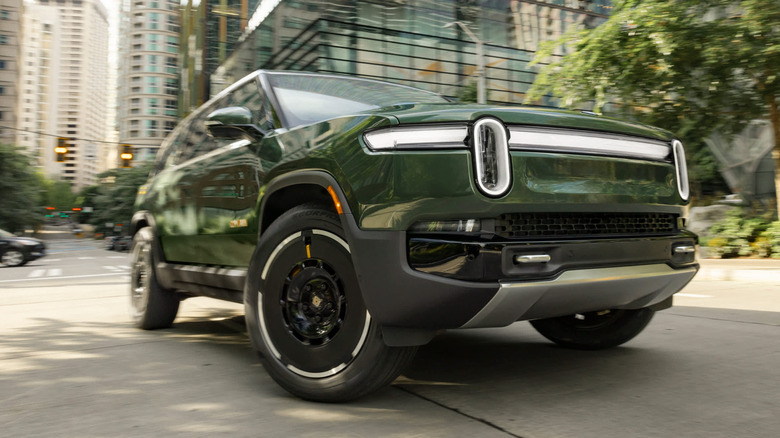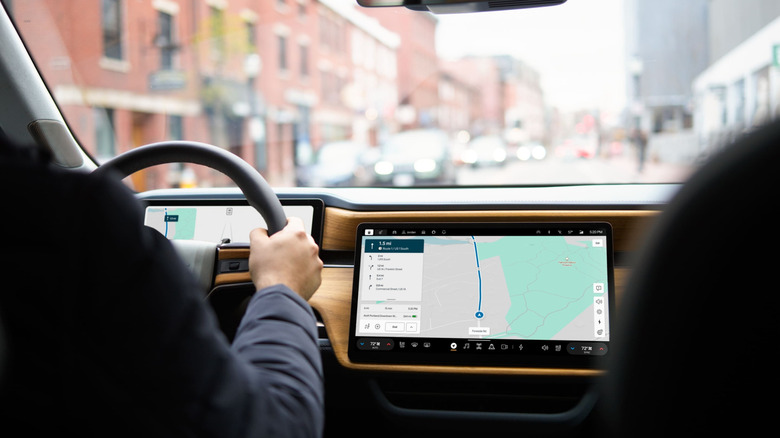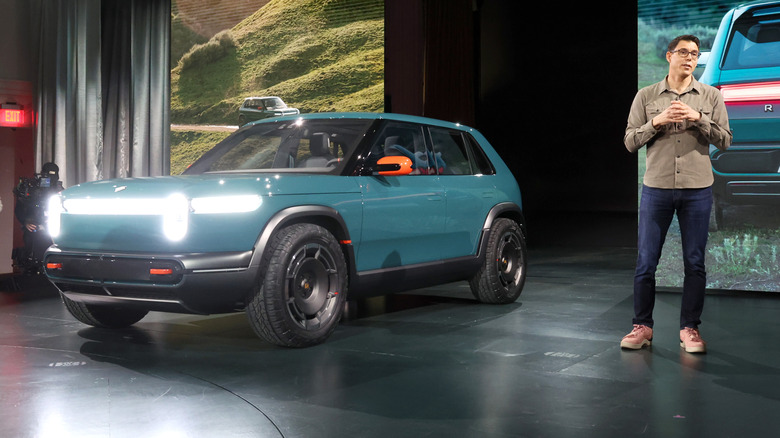Rivian Is Skipping On Apple CarPlay And Users Aren't Happy
Over a year ago, Rivian founder and CEO RJ Scaringe sat for an interview and gave a rather blunt comparison to justify the lack of CarPlay support on the brand's EVs. He mentioned that putting Apple's infotainment system in Rivian cars would be similar to Apple choosing Windows on Macs instead of developing its own computing software. Back then, Scaringe made it clear that full-blown CarPlay wasn't happening, though some of the apps would appear down the road. A year later, when the Rivian chief again sat for an interview, he doubled down on the decision to skip CarPlay, noting that it would take away from the user experience uniformity.
Yet, once again, he clarified that more features borrowed from Apple's ecosystem will appear in Rivian's electric cars in the near future. "So piece by piece, everything that someone may have missed from their CarPlay experience, whether it was a mapping, or soon we're going to have a voice-to-text, is going to be there, and it'll be beautiful," he said in an interview with The Verge. The company's founder even joked that the company was eyeing Apple's CarPlay Ultra, which itself has received a lukewarm reception from the automobile industry.
As far as Rivian goes, the company's in-car screen-bound experiences aren't as advanced as those offered by Tesla, but when it comes to CarPlay, the company's CEO says he's "really convicted on this." The company is apparently following in the footsteps of Tesla, which has tightly gated the in-car infotainment system but has steadily opened the doors for a variety of external experiences, such as Steam games, while also laying the groundwork for supporting third-party apps.
The community is divided on CarPlay
Rivian's decision to ditch CarPlay might make sense from a carmaker's perspective, but for users with an iPhone in their pocket, that's a huge miss. In a market like the U.S., where iPhones account for over half of the entire mobile operating system market, the lack of a familiar (and connected) experience in cars has attracted a lot of criticism. The debate within the Rivian community on Reddit has been particularly enlightening, and at times, rather furious, as well.
I absolutely love @Rivian but I hope they reconsider their choice of no Apple Carplay or Carplay Ultra
— Andrew Girgis (@AndrewGirgis) October 11, 2025
"While I appreciate Rivian's native infotainment system, CarPlay offers a seamless driving experience with deeper integration into lifestyle features, navigation apps (like Google Maps & Waze), calendars, notifications, health alerts, automations, reminders, messaging, AI, and Siri voice controls," wrote one Rivian R1T owner. Many are demanding that Rivian follow in the footsteps of Lucid, which plays well with Android Auto and Apple CarPlay.
Who says you can't have @Apple CarPlay in a @Rivian?? Thx EVPlay! pic.twitter.com/ggvXYKeAaT
— VAughn STewart (@vStewed) August 13, 2025
The debate, however, is not entirely one-sided. In a few conversations, Rivian car owners have expressed a positive attitude towards the lack of CarPlay and a unique UI that tightly integrates the software-hardware experience. "So I was also real annoyed at the lack of CarPlay, as I'd been using it for 8ish years. Got my Rivian last year. I just had a rental F150 on vacation with CarPlay and I went "... oh I like the Rivian software much more," wrote another user. The experience also depends on whether the apps uses are already available, or missing.
It's just not convenient
The arguments given by Rivian's chief make sense to a certain extent, but if you read the fine print, the company wants to maintain absolute control over the hardware-software harmony. That makes sense from an engineering perspective, as well. But at some point, the goalpost of a harmonious experience becomes an impediment to the actual user experience inside a car, especially when it comes to convenience. And at this conjecture, Rivian's arguments fall flat.
I don't want to deal with an entirely new user interface spanning across a massive screen, every time I enter my car. Our lives are already separated across screens running Windows or macOS on computing devices, Android or iOS on phones and tablets, and custom software on smart home devices such as Amazon's Echo Show. Each platform has its own nuances and a definitive learning curve. Burdening users with yet another software experience for everything from navigation to texting isn't quite the right approach.
Just take a look at the recent Google showcase with Mercedes, which involved using the Gemini assistant. The overarching idea is to make everything as convenient as possible, and if that involves talking to an assistant and getting stuff done without having to touch and tap on a massive screen, it's still the right approach. And if that ain't feasible, just give users something they are deeply familiar with. In this case, CarPlay is the way forward. After all, if consumers didn't yearn for it, products such as EV Play, that can put CarPlay in Rivian cars at a $400 hit on the wallet, wouldn't exist in the first place.


